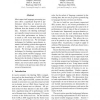Free Online Productivity Tools
i2Speak
i2Symbol
i2OCR
iTex2Img
iWeb2Print
iWeb2Shot
i2Type
iPdf2Split
iPdf2Merge
i2Bopomofo
i2Arabic
i2Style
i2Image
i2PDF
iLatex2Rtf
Sci2ools
137
click to vote
ACL
2010
2010
Open-Domain Semantic Role Labeling by Modeling Word Spans
Most supervised language processing systems show a significant drop-off in performance when they are tested on text that comes from a domain significantly different from the domain of the training data. Semantic role labeling techniques are typically trained on newswire text, and in tests their performance on fiction is as much as 19% worse than their performance on newswire text. We investigate techniques for building open-domain semantic role labeling systems that approach the ideal of a train-once, use-anywhere system. We leverage recently-developed techniques for learning representations of text using latent-variable language models, and extend these techniques to ones that provide the kinds of features that are useful for semantic role labeling. In experiments, our novel system reduces error by 16% relative to the previous state of the art on out-of-domain text.
Related Content
| Added | 10 Feb 2011 |
| Updated | 10 Feb 2011 |
| Type | Journal |
| Year | 2010 |
| Where | ACL |
| Authors | Fei Huang, Alexander Yates |
Comments (0)

